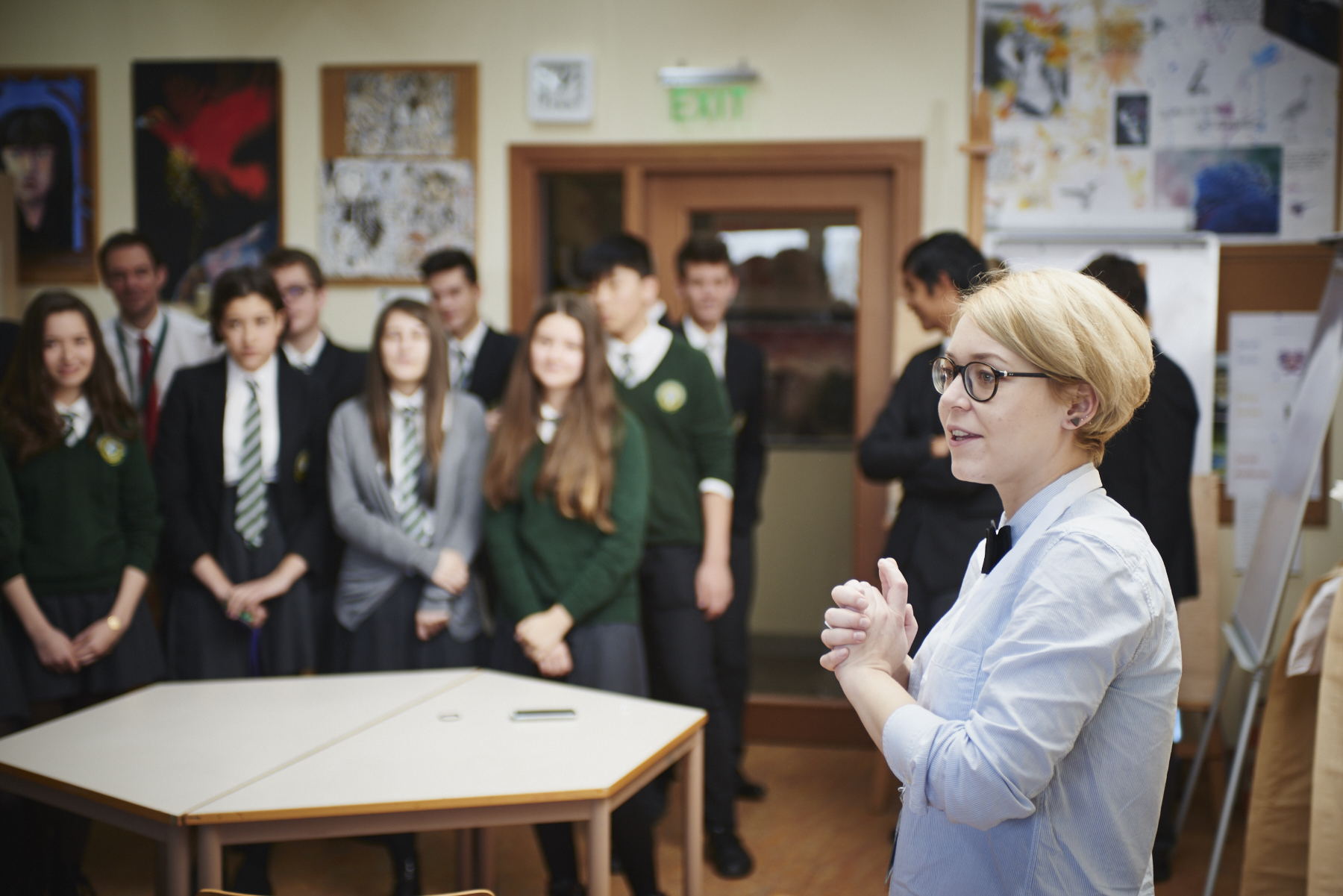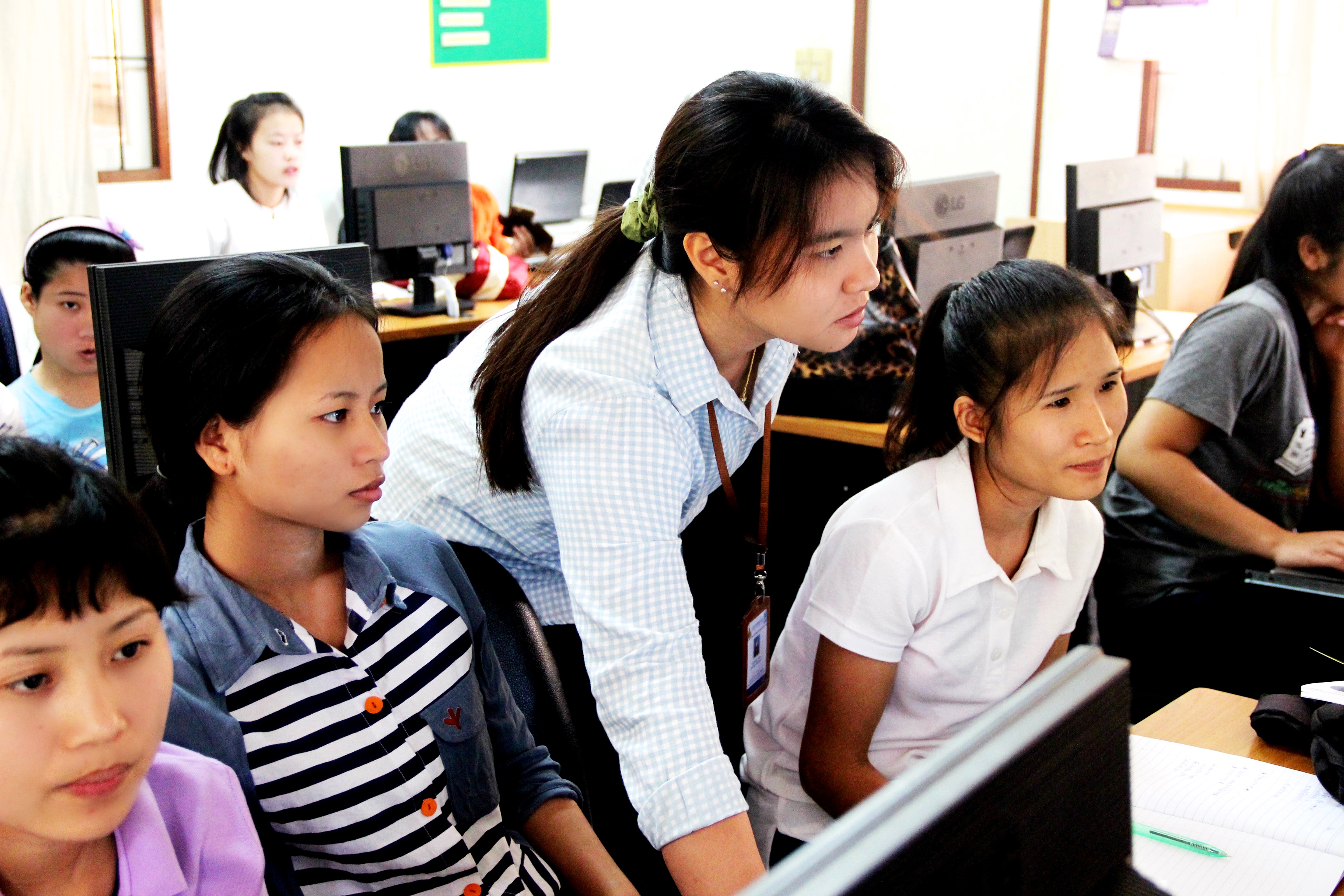Category : PROMOTE WOMEN IN THE TECHNOLOGY SECTOR
Technovation Challenge – USA
 Since 2010, thousands of girls between the ages of 10-18 in 64 countries have participated in the mobile app entreprenership competition and completed an online curriculum program which allows them to learn: coding, problem solving skills, business skills, team work and benefit from a unique mentoring experience. Girls in the program identify a problem in their community and leverage technology to solve it. The Technovation Challenge program simultaneously offers professional development opportunities for female professionals to serve as mentors. It's base of 3,500 volunteer women mentors, teachers and regional ambassadors help provide high quality support to each girl at a low cost. 5,000 girls across 64 countries have finished the entire 3 month program and developed apps and business plans that address local challenges such as access to clean water, early marriage, education and employment, and health care. Additionally, many women mentors have gone on to launch their own startups.
Since 2010, thousands of girls between the ages of 10-18 in 64 countries have participated in the mobile app entreprenership competition and completed an online curriculum program which allows them to learn: coding, problem solving skills, business skills, team work and benefit from a unique mentoring experience. Girls in the program identify a problem in their community and leverage technology to solve it. The Technovation Challenge program simultaneously offers professional development opportunities for female professionals to serve as mentors. It's base of 3,500 volunteer women mentors, teachers and regional ambassadors help provide high quality support to each girl at a low cost. 5,000 girls across 64 countries have finished the entire 3 month program and developed apps and business plans that address local challenges such as access to clean water, early marriage, education and employment, and health care. Additionally, many women mentors have gone on to launch their own startups.
Women In Technology Uganda – Uganda

Women In Technology Uganda's mission is to support the local capacity building and skills development for technology and entrepreneurship in Uganda. WITU offers a collaborative environment for training, mentorship, and knowledge sharing to young women and girls from underserved communities aged 10- 30 in order to drive social and economic development in the region. Through training in computer skills, early stage business development and advisory services, start up incubation and acceleration,
networking events and hackathons, Women In Technology encourages active and vibrant community of female tech entrepreneurs and developers in Uganda.
Cisco Networking Academy – USA
The Cisco Networking Academy curriculum combines in-depth technical training and professional skills development to prepare students for the workplace. Courses compliment academic and vocational programmes by preparing students for ICT jobs and globally recognized industry certificated. Specific national programmes have been established to encourage and promote women's participation. Cisco Networking Academy is available in over 9,000 institutions in 176 countries around the world, and more than 5.5 million people have participated in the Networking Academy since 1997.
Roxana
Rugina,
CEO & Founder, Simplon Romania – Romania
Roxana Rugina founded Simplon Romania – a training centre, coding club, incubator and social start up factory – in 2014. The organization is focused on diversity, innovation in education and closing the digital gap, benefitting more than 1460 participants at over 30 events. The international network was described as an innovative digital player by the President of France in 2014. Simplon Romania plans to launch an e-learning platform and partner networks across Europe in 2016.
Category : APPLY TECHNOLOGY FOR WOMEN'S EMPOWERMENT
Cherie Blair Foundation for Women – UK
 The Cherie Blair Foundation for Women provides female entrepreneurs in developing and emerging economies with the skills, technology, networks and access to finance they need to become owners of successful small and growing businesses. Working in partnership with non-profit, private and public sectors, they develop sustainable solutions to the challenges that female entrepreneurs face through three core programmes: Mentoring Women in Business, Mobile Technology and Enterprise Development. The programme spans across Africa, Asia, the Middle East and Central and South America, and continues to grow. Support to female entrepreneurs is also provided through Business Women, a mobile learning tool programme, developed in partnership with the ExxonMobil Foundation and Nokia. Business Women provides business management information to women entrepreneurs via their mobile phones, addressing challenges such as digital channels, affordable resources and training. The application delivers five to six SMS messages per week to subscribers, with bite-size information on bookkeeping, customer relations, personnel management and sources of capital. A year-long business training curriculum was developed with content tailored to local settings by an international consultancy and local NGOs.
The Cherie Blair Foundation for Women provides female entrepreneurs in developing and emerging economies with the skills, technology, networks and access to finance they need to become owners of successful small and growing businesses. Working in partnership with non-profit, private and public sectors, they develop sustainable solutions to the challenges that female entrepreneurs face through three core programmes: Mentoring Women in Business, Mobile Technology and Enterprise Development. The programme spans across Africa, Asia, the Middle East and Central and South America, and continues to grow. Support to female entrepreneurs is also provided through Business Women, a mobile learning tool programme, developed in partnership with the ExxonMobil Foundation and Nokia. Business Women provides business management information to women entrepreneurs via their mobile phones, addressing challenges such as digital channels, affordable resources and training. The application delivers five to six SMS messages per week to subscribers, with bite-size information on bookkeeping, customer relations, personnel management and sources of capital. A year-long business training curriculum was developed with content tailored to local settings by an international consultancy and local NGOs.
The Research Center of Communication and Development Knowledge Management (CCDKM) – Thailand
CCDKM has been a leader in reaching specific groups of women that are often significantly left out of the digital world and its associated benefits. The establishment of the first SMART GLOCAL ACADEMIES for marginalised people in Thailand, created a platform for marginalized homeworkers to co-develop e-service Action Plans that would extend the benefits of technology to: enhance their local businesses, expand their networks in ASEAN, and trade online through e-commerce solutions. CCDKM has trained 100,000 marginalised women and girls from Thailand on digital literacy who now have access to health care services, benefit from educational programs and have become financially independent and competitive in the labour market. Outreach to women farmers on use of technology, and to telecentre networks on matters of promoting gender equlity, has helped to bridge important gaps around women's meaningful use of technology. Based on its scucess, CCDKM's work has been expanded throughout ASEAN states.
 Ooredoo - Qatar
Ooredoo - Qatar
Ooredoo has invested heavily into accelerating the female digital economy across its global footprint, both through developing dedicated products for female customers and creating enhanced opportunities for female employment and development. Initiatives to empower women through technology include 'Almas line', a dedicated phone line for women in Iraq,; 'MayMay', a maternal healthcare app in Myanmar; support for 'womenpreneurs' in Indonesia through the 'INSPERA' initiative; and the 'Smartwomen' app, an educational app which promotes professional and personal development designed for women in Oman and Qatar.
 Community Development Association (CDA) - Georgia
Community Development Association (CDA) - Georgia
Community Development Association (CDA) targets problems faced by female smallholder farmers in mountain communities of Georgia. An agribusiness communication system for residents of Georgia promotes networking and cooperation among female smallholder farmers, especially in mountain communities, and connects women farmers to networks of local small- and medium enterprises (SMEs) that consumer agro-products. The use of both mobile- marketing- networking tools and an e-platform drastically enhances access to economic resources and services, which promotes the rapid expansion of a female social network with strong pro-entrepreneurial features
Category: DEVELOP GENDER RESPONSIVE ICT GOVERNANCE, POLICY AND ACCESS
Safety Net Project (National Network to End Domestic Violence) – USA
The Safety Net Technology Project (Safety Net) at the U.S. National Network to End Domestic Violence (NNEVD) is the first project to address technology safety for survivors of domestic violence, sexual assault, stalking, and dating violence. In the past fifteen years, Safety Net has hosted 1,000 training events attended by more than 73,000 victim service providers, law enforcement, and NGOs. To date, more than 38,000 websites have implemented robust website safety notices using NNEDV's template language that warns about the dangers of computer monitoring and encourages victims to use a safer computer or contact the police.
 Hanane Boujemi, Senior Manager, Internet Governance Programme MENA Region,
Hivos – the Netherlands
Hanane Boujemi, Senior Manager, Internet Governance Programme MENA Region,
Hivos – the Netherlands
Hanane Boujemi manages the Internet Governance Programme MENA region. The programme aims to get Internet Governance civic actors from the MENA region more involved in the policy making process locally, regionally and globally. The programme has trained over 200 participants in the last three years, 50 per cent of whom are women. Mrs. Boujemi also. Mrs. Boujemi has consistently contributed to the global Internet Governance process since 2006, and coordinated input from the wider MENA region Internet Governance community at NETmundial in Sao Paulo 2014. She is also a driving force behind engaging civic actors and governments from the MENA region in a dialogue to overcome Internet policy challenges which hinder public interest.
 Mujeres Digitales (Government of the State of Antioquia) – Colombia
Mujeres Digitales (Government of the State of Antioquia) – Colombia
Mujeres Digitales is an educational program developed by the Government of the State of Antioquia. It consists of an innovative networking and mentoring scheme organized by key women who have the potential to empower others, which is carried across rural and semi-urban areas through face-to-face meetings, forums, cultural activities, and online networking. Additionally, a digital portal created by women for women focuses on important areas for women's empowerment including health, education, economic autonomy, peace, shared domestic responsibility, political participation and violence.
The Senegal Ministry of Posts and Telecommunications has instituted a broad ranging programme designed to reduce the gender digital divide and create a policy environment and investments that support digital equality. The Ministry established a Gender Unit responsible for overseeing the institutionalization of gender dimensions in the ICT sector and strengthening the participation of Sengalese women in public and private intitutions of the ICT sector, particularly in decision-making bodies. Training on digital skills, entreprensership and leadership has led to greater confidence and motivation amongst young women to pursue careers in the ICT sector. Importantly, women policitcal leaders have also been targeted as key digital leaders and supported to take on this role. Programmes around e-business, health and reproductive rights, and competitions to address socio-economic challenges have also been supported by the government, ensuring that relevant content is being developed by and for women. The role of boys and men in supporting gender equality in the technology sector has been a unique feature of the programme.
